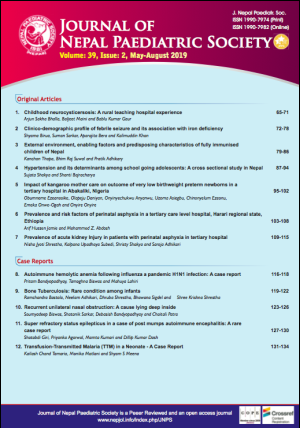Super Refractory Status Epilepticus in a Case of Post Mumps Autoimmune Encephalitis: A Rare Case Report
DOI:
https://doi.org/10.3126/jnps.v39i2.27862Keywords:
Mesial Temporal Sclerosis, Mumps Encephalitis, Super Refractory Status Epilipticus (SRSE)Abstract
Seizure is a common problem in many paediatric patients. When seizures persist even after 24 hrs of anaesthetic treatment it is known as Super Refractory Status Epilepticus (SRSE). We report a 10 years old girl admitted with fever, altered sensorium and GTCS with a provisional diagnosis of viral encephalitis. In the line of SRSE infusion thiopental was also started after giving first line antiepileptic as per guidelines. Seizures persisted despite six anti-epileptic drugs, steroids and infusion anaesthetic. MRI brain was suggestive of T2W Flair hyperintensity in B/L hippocampal and Para-hippocampal gyrus and CSF and blood positive for Mumps IgM. This was suggestive of Mesial temporal sclerosis (MTS) which is the scarring and loss of neurons in the deepest portion of the temporal lobe due to oxygen starvation to the brain, head trauma, brain infection or without any apparent cause. Dramatic response was seen after 36-48 hours of IVIG administration.
Downloads
Downloads
Published
How to Cite
Issue
Section
License
Authors who publish with this journal agree to the following terms:
Authors retain copyright and grant the journal right of first publication with the work simultaneously licensed under a Creative Commons Attribution License that allows others to share the work with an acknowledgement of the work's authorship and initial publication in this journal.
Authors are able to enter into separate, additional contractual arrangements for the non-exclusive distribution of the journal's published version of the work (e.g., post it to an institutional repository or publish it in a book), with an acknowledgement of its initial publication in this journal.
Authors are permitted and encouraged to post their work online (e.g., in institutional repositories or on their website) prior to and during the submission process, as it can lead to productive exchanges, as well as earlier and greater citation of published work (See The Effect of Open Access).



